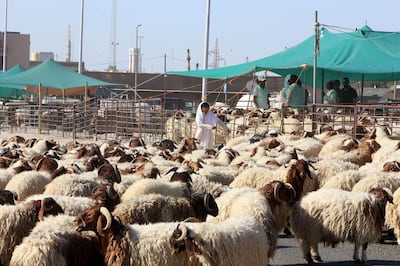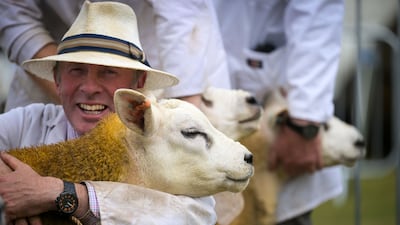British sheep meat sales to the Middle East have rocketed with exports to Jordan, Kuwait and the UAE seeing large increases.
It comes as the UK launches a trade mission to Kuwait next week to promote British lamb.
The Agriculture and Horticulture Development Board, a statutory levy board funded by farmers and growers, told The National the Middle East is a key market.
It is investing £180,000 in the Middle East’s 2024 Gulfood festival, which will take place at the Dubai World Trade Centre in February, to showcase British produce.
“The Middle East remains a key strategic market for UK exporters with increasing demand for quality products the UK has to offer the region,” said Jonathan Eckley, AHDB's head of international trade development.
“Gulfood provides the ideal platform to meet key players in this important market. The scale of the show also now attracts buyers from further afield, including many African markets and South-East Asia.
“It is therefore an important meeting point with key contacts from global markets for our exporters and AHDB looks forward to hosting levy payers there next February.”
The latest figures from HM Revenue and Customs show that from January to June this year sheep meat exports, including offal, were worth £277 million (up 12.9 per cent on the year) and volumes stood at 43,374 tonnes (up 16.1 per cent).
Exports to non-EU countries increased by 14.1 per cent in value year-on-year, while volume was up by 25.5 per cent.
This included exports worth £3.9 million to Kuwait (up 20.9 per cent on the year), £780,471 to the UAE (a 2.8 per cent rise) and £135,218 to Jordan (an increase of 122 per cent).
“The value of sheep meat exports from the UK in the first half of the year have been very encouraging, driven by demand from high-value markets in northern Europe and burgeoning markets in the Middle East,” Mr Eckley said.
“Post-pandemic demand in the Middle East in particular is welcome as the region represents one of AHDB’s key strategic markets for the sheep meat sector.”
Last year shipments of lamb to the UAE increased 73 per cent in value to £1.5 million.
It has led the AHDB to commit to funding a stand at Gulfood for the next three years.
“AHDB's objective for attending the show is to provide a platform for our levy paying meat producers to create new business relationships with international meat buyers,” it said.

Next week AHDB will be joined by five British exporters on a three-day trade mission to Kuwait.
The visit follows the recent launch of AHDB’s new strategy Beyond Borders, which is aimed at increasing market access and sales while encouraging and supporting more businesses to export.
AHDB’s halal sector senior manager Awal Fuseini said the Middle East and North Africa market is a key target market for exporters, due to the region’s population growing quickly and more people having a high disposable income.
He believes these factors are set to drive up food imports to the area over the next decade.
“The GCC is a high value market which presents new opportunities for UK exporters,” he said.
“The region is very import-dependent and food import regulations and standards are strictly enforced, given strong adherence to the Islamic faith.
“The expansion of the middle-class consumer in Kuwait and the entire GCC region is driving an increased demand for meat and dairy, and for high quality imported foods.
“The UK is well placed to capitalise on this increased demand with the UK brand associated with quality and heritage in these markets.”


